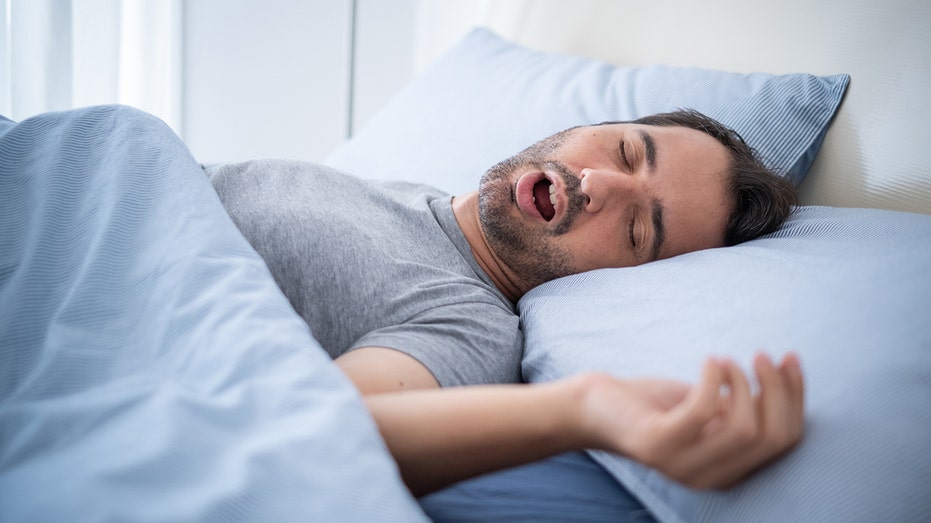- February 26, 2024
- 10 minutes read
Untreated sleep apnea presents ‘disruptive’ dangers to people’s lives, including heart issues, says expert

Esther Rodriguez Villegas, a professor at Imperial College London and founder of the London-based medical technology company Acurable, is sharing common health and well-being issues that can result from sleep apnea — a problem that can be disruptive for both sufferers as well as their loved ones.
One of these risks is cardiovascular disease. The sudden and frequent drops in blood oxygen caused by sleep apnea can “put a strain on the cardiovascular system and cause increased blood pressure,” Villegas told Fox News Digital in an interview.
“If symptoms persist over a long period of time, this increases the chances of serious cardiovascular problems, such as heart attacks, strokes or abdominal aortic aneurysms, to name a few,” she said.
SLEEP DEPRIVATION DANGERS: HOW PULLING AN ALL-NIGHTER AFFECTS YOUR PHYSICAL AND MENTAL HEALTH
The “potentially serious” sleep disorder known as sleep apnea causes breathing to stop and start repeatedly during sleep, according to Mayo Clinic’s definition.
Obstructive sleep apnea (OSA) is one type of sleep apnea that occurs when “throat muscles relax and block the flow of air to the lungs,” Mayo Clinic explained on its website.
Central sleep apnea (CSA) happens when the brain fails to send proper signals to the muscles that control breathing.
And yet, while sleep apnea can affect anyone, certain factors such as excessive weight and thicker neck circumference, which can cause narrower airways, can increase the risk, according to Mayo Clinic.
DOES THE ‘SLEEPY GIRL MOCKTAIL’ REALLY WORK? EXPERT WEIGHS IN ON THE VIRAL SLEEP TREND
Older men are at a higher risk of sleep apnea, as well as those who consume alcohol, smoke or use sedatives or tranquilizers.
Increasing evidence suggests that the drops in oxygen are linked to years of reduction in life expectancy, the doctor noted.
Diabetes can be another outcome of sleep apnea, as patients with type 2 diabetes have a “very high” prevalence of OSA, according to Villegas.
“Unfortunately, most don’t know they have obstructive sleep apnea, while recent evidence has demonstrated that untreated disease leads to significantly worse glycemic control — in other words, worse progression of their diabetes,” she said.
WANT TO BE A MORNING PERSON? THESE 6 EXPERT TIPS MAY GET YOU THERE
Since sleep apnea “severely disrupts rest at night,” Villegas warned that the condition can impair energy and concentration levels during the day.
This can result in an increased risk of car accidents, according to the expert.
“The statistics vary, but it is thought that in Europe, for example, untreated sleep apnea is the second leading cause of car accidents,” she said.
This lack of energy can also affect school or work performance, which can lead to disciplinary issues or accidents.
GOOGLE SEARCHES FOR ‘SLEEP’ REACHED ALL-TIME HIGH IN 2023, NEW STUDY NOTES
“Children with sleep apnea are often found to underperform at school and are sometimes misdiagnosed with ADHD,” said Villegas.
“They are often labeled as aggressive or having behavioral issues, when in fact it is the result of untreated sleep apnea.”
People with sleep apnea are also more likely to experience mental health issues, Villegas added, such as low mood, irritability, anxiety and depression.
Recognizing sleep apnea
A frequent symptom of sleep apnea is loud snoring, which is usually a clear warning sign for partners or family members in the home.
NEW YEAR CAN BRING BETTER SLEEP AT NIGHT IF YOU FOLLOW THESE 9 SMART STEPS
But there are some hidden sleep apnea symptoms that could be overlooked, Villegas warned.
These can include waking up frequently at night; waking in the morning with a headache, dry mouth, or sore throat; or feeling fatigued, irritable or in a bad mood during the day.
Other sneaky symptoms of sleep apnea can include night sweats and erectile dysfunction, Villegas said.
Sleep apnea in children can show up as bad behavior, struggles at school, or sleeping in unusual positions, like with their neck extended.
Treating the condition
The most common treatment for sleep apnea is a continuous positive airway pressure (CPAP) machine, which Villegas described as a “mask worn overnight that pushes pressurized air into the windpipe to keep it open while sleeping.”
CLICK HERE TO SIGN UP FOR OUR HEALTH NEWSLETTER
Alternative treatments include a variety of mandibular advancement devices (MADs), which hold the tongue and jaw in the correct position to prevent airway blockages.
Nose, throat and mouth surgery could also help correct these blockages, Villegas said, while tonsillectomies are common in children.
In many cases, lifestyle changes such as weight loss, reducing alcohol intake and quitting smoking can improve or eliminate symptoms entirely, Villegas said.
CLICK HERE TO GET THE FOX NEWS APP
Approximately 30 million people have sleep apnea in the U.S. — yet only six million are officially diagnosed, according to the American Medical Association.
For those who believe they may have sleep apnea, Mayo Clinic recommends seeking out a health care provider for examination and treatment.
For more Health articles, visit www.foxnews.com/health.
